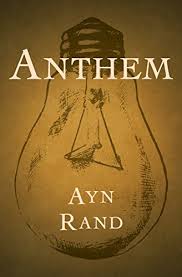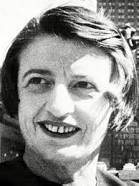Anthem Page #5
Anthem is a dystopian fiction novella by Russian-American writer Ayn Rand, written in 1937 and first published in 1938 in the United Kingdom. The story takes place at an unspecified future date when mankind has entered another Dark Age.
of our punishment, if it be discovered, is not for the human heart to ponder. Never, not in the memory of the Ancient Ones’ Ancients, never have men done that which we are doing. And yet there is no shame in us and no regret. We say to ourselves that we are a wretch and a traitor. But we feel no burden upon our spirit and no fear in our heart. And it seems to us that our spirit is clear as a lake troubled by no eyes save those of the sun. And in our heart—strange are the ways of evil!—in our heart there is the first peace we have known in twenty years. PART TWO Liberty 5-3000... Liberty five-three thousand ... Liberty 5-3000.... We wish to write this name. We wish to speak it, but we dare not speak it above a whisper. For men are forbidden to take notice of women, and women are forbidden to take notice of men. But we think of one among women, they whose name is Liberty 5-3000, and we think of no others. The women who have been assigned to work the soil live in the Homes of the Peasants beyond the City. Where the City ends there is a great road winding off to the north, and we Street Sweepers must keep this road clean to the first milepost. There is a hedge along the road, and beyond the hedge lie the fields. The fields are black and ploughed, and they lie like a great fan before us, with their furrows gathered in some hand beyond the sky, spreading forth from that hand, opening wide apart as they come toward us, like black pleats that sparkle with thin, green spangles. Women work in the fields, and their white tunics in the wind are like the wings of sea-gulls beating over the black soil. And there it was that we saw Liberty 5-3000 walking along the furrows. Their body was straight and thin as a blade of iron. Their eyes were dark and hard and glowing, with no fear in them, no kindness and no guilt. Their hair was golden as the sun; their hair flew in the wind, shining and wild, as if it defied men to restrain it. They threw seeds from their hand as if they deigned to fling a scornful gift, and the earth was a beggar under their feet. We stood still; for the first time did we know fear, and then pain. And we stood still that we might not spill this pain more precious than pleasure. Then we heard a voice from the others call their name: “Liberty 5-3000,” and they turned and walked back. Thus we learned their name, and we stood watching them go, till their white tunic was lost in the blue mist. And the following day, as we came to the northern road, we kept our eyes upon Liberty 5-3000 in the field. And each day thereafter we knew the illness of waiting for our hour on the northern road. And there we looked at Liberty 5-3000 each day. We know not whether they looked at us also, but we think they did. Then one day they came close to the hedge, and suddenly they turned to us. They turned in a whirl and the movement of their body stopped, as if slashed off, as suddenly as it had started. They stood still as a stone, and they looked straight upon us, straight into our eyes. There was no smile on their face, and no welcome. But their face was taut, and their eyes were dark. Then they turned as swiftly, and they walked away from us. But the following day, when we came to the road, they smiled. They smiled to us and for us. And we smiled in answer. Their head fell back, and their arms fell, as if their arms and their thin white neck were stricken suddenly with a great lassitude. They were not looking upon us, but upon the sky. Then they glanced at us over their shoulder, as we felt as if a hand had touched our body, slipping softly from our lips to our feet. Every morning thereafter, we greeted each other with our eyes. We dared not speak. It is a transgression to speak to men of other Trades, save in groups at the Social Meetings. But once, standing at the hedge, we raised our hand to our forehead and then moved it slowly, palm down, toward Liberty 5-3000. Had the others seen it, they could have guessed nothing, for it looked only as if we were shading our eyes from the sun. But Liberty 5-3000 saw it and understood. They raised their hand to their forehead and moved it as we had. Thus, each day, we greet Liberty 5-3000, and they answer, and no men can suspect. We do not wonder at this new sin of ours. It is our second Transgression of Preference, for we do not think of all our brothers, as we must, but only of one, and their name is Liberty 5-3000. We do not know why we think of them. We do not know why, when we think of them, we feel all of a sudden that the earth is good and that it is not a burden to live. We do not think of them as Liberty 5-3000 any longer. We have given them a name in our thoughts. We call them the Golden One. But it is a sin to give men names which distinguish them from other men. Yet we call them the Golden One, for they are not like the others. The Golden One are not like the others. And we take no heed of the law which says that men may not think of women, save at the Time of Mating. This is the time each spring when all the men older than twenty and all the women older than eighteen are sent for one night to the City Palace of Mating. And each of the men have one of the women assigned to them by the Council of Eugenics. Children are born each winter, but women never see their children and children never know their parents. Twice have we been sent to the Palace of Mating, but it is an ugly and shameful matter, of which we do not like to think. We had broken so many laws, and today we have broken one more. Today, we spoke to the Golden One. The other women were far off in the field, when we stopped at the hedge by the side of the road. The Golden One were kneeling alone at the moat which runs through the field. And the drops of water falling from their hands, as they raised the water to their lips, were like sparks of fire in the sun. Then the Golden One saw us, and they did not move, kneeling there, looking at us, and circles of light played upon their white tunic, from the sun on the water of the moat, and one sparkling drop fell from a finger of their hand held as frozen in the air. Then the Golden One rose and walked to the hedge, as if they had heard a command in our eyes. The two other Street Sweepers of our brigade were a hundred paces away down the road. And we thought
Translation
Translate and read this book in other languages:
Select another language:
- - Select -
- 简体中文 (Chinese - Simplified)
- 繁體中文 (Chinese - Traditional)
- Español (Spanish)
- Esperanto (Esperanto)
- 日本語 (Japanese)
- Português (Portuguese)
- Deutsch (German)
- العربية (Arabic)
- Français (French)
- Русский (Russian)
- ಕನ್ನಡ (Kannada)
- 한국어 (Korean)
- עברית (Hebrew)
- Gaeilge (Irish)
- Українська (Ukrainian)
- اردو (Urdu)
- Magyar (Hungarian)
- मानक हिन्दी (Hindi)
- Indonesia (Indonesian)
- Italiano (Italian)
- தமிழ் (Tamil)
- Türkçe (Turkish)
- తెలుగు (Telugu)
- ภาษาไทย (Thai)
- Tiếng Việt (Vietnamese)
- Čeština (Czech)
- Polski (Polish)
- Bahasa Indonesia (Indonesian)
- Românește (Romanian)
- Nederlands (Dutch)
- Ελληνικά (Greek)
- Latinum (Latin)
- Svenska (Swedish)
- Dansk (Danish)
- Suomi (Finnish)
- فارسی (Persian)
- ייִדיש (Yiddish)
- հայերեն (Armenian)
- Norsk (Norwegian)
- English (English)
Citation
Use the citation below to add this book to your bibliography:
Style:MLAChicagoAPA
"Anthem Books." Literature.com. STANDS4 LLC, 2025. Web. 10 Mar. 2025. <https://www.literature.com/book/anthem_329>.








Discuss this Anthem book with the community:
Report Comment
We're doing our best to make sure our content is useful, accurate and safe.
If by any chance you spot an inappropriate comment while navigating through our website please use this form to let us know, and we'll take care of it shortly.
Attachment
You need to be logged in to favorite.
Log In